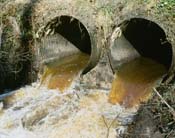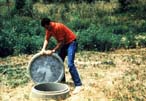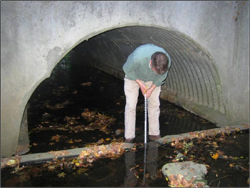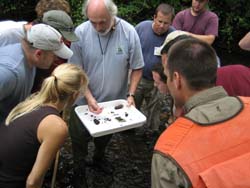About
Water Quality & Your Drinking Water
Protecting water sources is essential to providing safe drinking water for North Carolina. Water sources exist in watersheds consisting of lakes, reservoirs, rivers, aquifers and springs. It’s water from these sources that supplies our water treatment facilities and wells.

Industry, agriculture and population growth have increased the use of industrial and household chemicals/ fertilizers and pesticides these all have adverse impacts on fresh water sources. Additionally, animal manure, dumping, littering and acid rain are just a few more of the many ways that water becomes polluted.
U. S. surface waters are protected from pollution with the Clean Water Act. All business, industries, municipalities etc. must obey these laws. Specific regulations apply to each of these entities. The Environmental Protection Agency (EPA) is the agency that sets the standards for controlling contaminants in water that could pose a risk to the public drinking water supply.
Protecting Drinking Water
When waterways and ground water become polluted and derogated the bacteria and contaminants build to unsatisfactory levels. Bacteria and contaminants make individual waterways, aquifers and springs either unsuitable for use or very expensive for utilities to treat and return to safe drinking water levels. The treatment of high levels of bacteria and contaminants increases costs because more energy and chemical treatments are needed. The cleaner we keep our basic water sources the less it will cost everyone people and business alike.
Although it’s a fact of nature that the cleanest waters have some levels of contaminants in them these contaminants don’t harm the general public but may cause problems for immune compromised individuals. Our U.S. municipal and private water utilities follow EPA drinking water standards which are among the best in the world. These standards do a great deal to assure the quality of our water supplies but they don’t do the job of supplying water. It’s the job of the local water utilities, state agencies, local health departments and a knowledgeable public working collectively to protect their watersheds which ensure the highest quality drinking water.
Even though human pollution is the major factor affecting our water supply there are others. When nature is overwhelmed by a weather situations like, excessive flooding or when municipal systems temporally fail instances do occur that can cause contaminants to reach levels that may make people sick. In both cases the public is notified as soon as possible by local health departments. For people who choose to use a well these notifications may or may not be useful.

In the U.S.10% of the public use wells, cisterns or springs for drinking water and are responsible for assuring the quality of it. There is little regulatory control over individual water supplies in rural areas and over site only happens during well development or when property transfers. Well owners must maintain and test regularly.
With the influx of new people to North Carolina, education about potential pollution problems and how to protect watersheds are essential. State agencies like the Cooperative Extension Service (CES) and N. C. Division of Water Quality are the networks that educate the public and industry about issues.
Urban homeowners, landscapers, and rental managers need to know about the proper use of chemicals to avoid excessive runoff into our waterways. Many use too much pesticides, herbicides and other chemicals to obtain lawn results. Uninformed farm owners and untrained farm workers may not understand the consequences of the improper use of chemicals, pesticides or other farming practices.

The improper use of chemicals, pesticides and herbicides like all types of pollution not only affect drinking water, but the health of ecosystems which are so vital to watershed health. Clean waterways protect children, and adults that swim in them and pets and animals that may be drinking directly form a waterway.
Citizens can do a lot to protect local water sources by learning about and assisting in the protection of their watershed. The things people can do aren’t hard they are just a matter of changing bad habits. Citizens can (1.) properly select the safest lawn fertilizers, pesticides, and other home chemicals that end up in storm drains hence, the watershed. (2.) remove litter and grass clippings from curbs to assure street drains are unblocked. (3.) properly dispose of pet waste, motor oil household chemicals, and garbage. (4.) monitor local water utilities and read and ask question (5.) don’t litter and pick-up litter — Its obvious our convenience food wraps, plastic bottles and bags etc. don’t degrade on the curbside (recycle them). (6.) promptly report street underground utility events, sewage backups, burst pipes, truck spills, and illegal dumping. (7.) join or financially support a local citizen group that is working to protect waters (8.) educate yourself and your children about the environment and develop good environmental habits.

Businesses, farms and municipalities must follow all Clean Water Act rules and regulations pertaining to their type of operation. They are responsible for educating, training, and enforcing workers to follow proper procedures that ensure compliance. Business should evaluate partners and sub-contractors to be sure they also comply with water regulations.
When citizens fully realize the consequences of pollution in their watersheds they begin to understand how directly it can affect their visual and pleasurable surroundings, health, property values, and their pocketbook. The same is true for a successful business because they depend on clean water for operations and a quality environment to attract good workers. When these things become apparent then people and business tend to become good stewards of the environment. The knowledge and action of people can greatly reduce the degradation in waters and make even greater improvements to drinking water quality.
Here are some resources for public involvement from NC DEQ.
